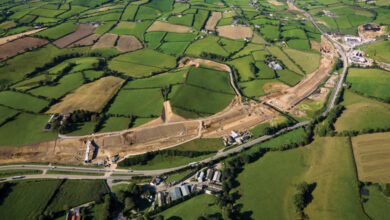DoE planning targets
 Developers must be prepared for more refusals as DoE planners stretch themselves to meet demanding targets.
Developers must be prepared for more refusals as DoE planners stretch themselves to meet demanding targets.
The processing of large scale applications within six months must move from being the exception to the rule in Northern Ireland’s planning system, under tight targets set down by ministers in the Programme for Government.
For planners, the key Programme for Government commitment is to make 90 per cent of large scale planning decisions (not necessarily approvals) within six months by 2015. The interim targets are 60 per cent for 2012-2013 and 75 per cent for 2013-2014. While final statistics are not available, it is understood that the record in 2011-2012 was below 30 per cent.
This represents a “really challenging” target according to Mary MacIntyre, the DoE’s Director of Strategic Planning, although judicial review applications are excluded. From now on, all assessments must be “done right, and done in time, and done upfront.” The clock starts ticking as soon as an application arrives in the division’s offices, and the six-month deadline will not allow for major revisions.
DoE planners may therefore find themselves having to turn down applications quickly, particularly where certain information is outstanding e.g. an environmental impact assessment. This would be a major culture change as the trend has been to negotiate all applications to a satisfactory solution.
The division is currently considering 50 applications determined under Article 31 of the Planning (Northern Ireland) Order 1991, including eight major out-of-town retail applications. Its specialist teams deal with renewables, waste, minerals and the new area of marine spatial planning.
Over 50 wind farm applications and the second North/South interconnector are also in the system. The division also handles large scale non-Article 31 applications and much of that workload is now being handled in local offices e.g. the new University of Ulster campus in Belfast.
The context for the division’s work is set by the Executive’s three key documents: the Programme for Government, the Economic Strategy and the Investment Strategy. The Programme for Government aims to achieve £1 billion of investment, of which around £375 million would come from foreign direct investment, and almost triple boost tourism numbers from 1.5 million in 2011 to 4.2 million by December 2014.
More productive and more focused pre-application discussions will play an important part in getting faster decisions. Under new legislation, to be introduced in 2013, regionally significant applications will be subject to a pre-application community consultation and planners are asking developers to trial that in advance.
The six-month target applies equally to planners and consultees. The department is seeking to ‘screen out’ applications where consultation is not necessary and produce standing guidance for applicants e.g. to explain the acceptable distances between developments and natural habitats.
Planners’ workload will be dominated by the target of 8,000 social and affordable homes, stadia projects at Ravenhill, Windsor Park and Casement Park, the Maze re-development, and the new police, prison and Fire Service college at Desertcreat, near Cookstown. They will need to allocate resources proportionally i.e. with the number of staff depending on the size and complexity of the project.
Ministers see the transfer of planning powers to councils as an important tool to help local businesses grow. The Economic Strategy emphasises the need for an “efficient and pro-business regulatory framework” which clearly includes planning. The Investment Strategy’s focus is not purely economic but also emphasises the need to invest in public services and the environment.
MacIntyre also sees a real need for “proper partnerships” between planners and developers, rather than confrontation. Indeed, officials are of the view that developers may be prepared to tolerate higher fees if delivery (i.e. faster decisions) can be guaranteed and all levels of planning take a pro-business attitude.





